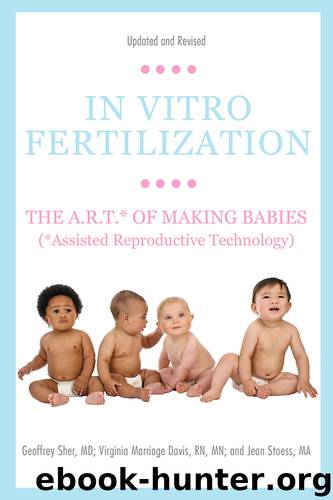In Vitro Fertilization by Geoffrey Sher

Author:Geoffrey Sher
Language: eng
Format: epub, azw3
Publisher: Skyhorse Publishing, Inc.
Published: 2013-01-01T05:00:00+00:00
Thrombophilias
Thrombophilia is the inherited tendency to develop blood clots. Thrombophilias are due to either the presence of too much of certain blood-clotting factors or too little of anti-clotting proteins in the blood. As many as one in five people in the United States has a thrombophilia.
Most women with a thrombophilia have healthy pregnancies. However, the thrombophilias can contribute to a number of pregnancy complications, including pregnancy loss (that most commonly occurs in the second or third trimester), placental abruption (when the placenta separates from the uterine wall, partially or completely, before delivery), and poor fetal growth. The thrombophilias also may cause preeclampsia, a pregnancy-related disorder characterized by high blood pressure and protein in the urine that can pose serious risks for mother and baby. Several of these problems are believed to result from blood clots in placental blood vessels that lead to changes in the placenta and reduced blood flow to the fetus.
Pregnant women in general are more likely than non-pregnant women to develop a venous thrombotic episode (VTE), or development of a blood clot in a vein. This is due to normal pregnancy-related changes in blood clotting in order to limit blood loss during labor and delivery. And pregnant women with a thrombophilia are at a higher risk than other pregnant women of developing a VTE. Studies suggest that more than half of pregnant women who develop a VTE have an underlying thrombophilia.
All pregnant women who have had a blood clot should be offered testing for hereditary thrombophilias. In addition, women with a family history of blood clots, pulmonary embolism (blood clot in the lung), or strokes that occurred prior to age 60; or a history of pregnancy complications, including stillbirth, early or severe preeclampsia, placental abruption, or poor fetal growth due to undetermined causes may be considered for testing.
Some pregnant women with thrombophilia are treated with one or more daily injections of low dose heparin, a blood-thinning drug, which does not cross the placenta and is safe for the baby. In some cases, physicians may recommend low doses of aspirin along with heparin. Lowdose aspirin with the B vitamins folic acid, B6, and B12 can be given to women who have one of the milder thrombophilias and a history of pregnancy complications, but not a history of blood clots.
Not all pregnant women with a thrombophilia need heparin treatment during pregnancy. Regular heparin can be supplanted with a newer form of heparin, called low-molecular-weight heparin (Lovenox and Clexane), that appears to pose a lower risk of side effects such as bone loss and can be injected once instead of twice daily (as with regular heparin) and which reduces the risk of local bruising, significantly.
Generally, treatment is not recommended for most pregnant women with one of the less severe thrombophilias (such as factor V Leiden or prothrombin mutation) and no history of blood clots or pregnancy complications. This is because the risk of blood clots or pregnancy complications due to thrombophilia appears to be less than 1 percent in these women.
Download
This site does not store any files on its server. We only index and link to content provided by other sites. Please contact the content providers to delete copyright contents if any and email us, we'll remove relevant links or contents immediately.
Name Book, The: Over 10,000 Names--Their Meanings, Origins, and Spiritual Significance by Astoria Dorothy(2987)
Tone Your Tummy Type by Denise Austin(2847)
The Ultimate Guide to Anal Sex for Women by Tristan Taormino(2298)
The Expectant Father by Armin A. Brott & Jennifer Ash(2273)
The Coregasm Workout by Debby Herbenick(2272)
The Women's Health Fitness Fix by Jen Ator(2242)
Expecting Better by Emily Oster(2212)
She-ology by Sherry A. Ross MD(2165)
The Hite Report on Shere Hite by Shere Hite(2064)
Woman: An Intimate Geography by Natalie Angier(1939)
8 Steps to Reverse Your PCOS by Fiona McCulloch(1915)
Birth by Tina Cassidy(1905)
The Female Brain by M.D. Louann Brizendine(1900)
101 Get-Lean Workouts and Strategies by Muscle & Fitness(1870)
Women & the Weight Loss Tamasha by Diwekar Rujuta(1801)
50 Ways to Soothe Yourself Without Food by Susan Albers(1792)
The Big Booty Blueprint: Your Guide To A Bigger Butt In Less Than 12 Weeks by Bella Rahbek & Brandon Carter(1672)
The overachievers by Robbins Alexandra(1580)
Unleash the Power of the Female Brain: Supercharging Yours for Better Health, Energy, Mood, Focus, and Sex by Daniel G. Amen M.D(1576)
